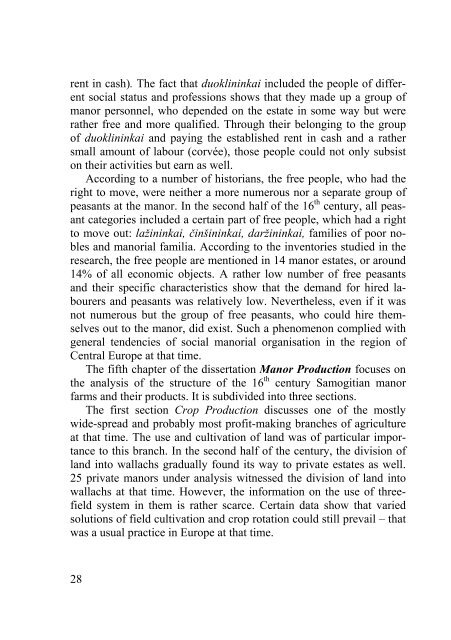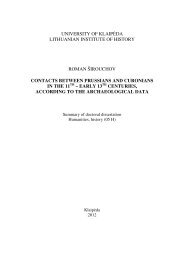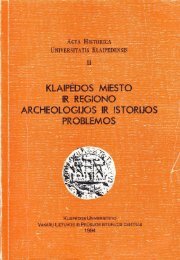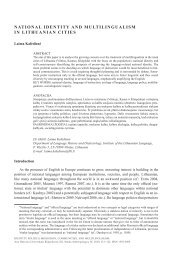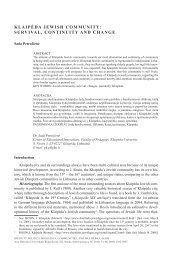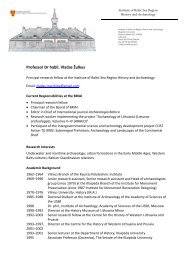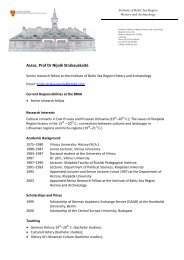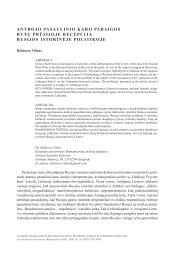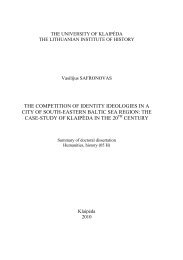See summary of dissertation in English - Baltijos regiono istorijos ir ...
See summary of dissertation in English - Baltijos regiono istorijos ir ...
See summary of dissertation in English - Baltijos regiono istorijos ir ...
You also want an ePaper? Increase the reach of your titles
YUMPU automatically turns print PDFs into web optimized ePapers that Google loves.
ent <strong>in</strong> cash). The fact that duokl<strong>in</strong><strong>in</strong>kai <strong>in</strong>cluded the people <strong>of</strong> different<br />
social status and pr<strong>of</strong>essions shows that they made up a group <strong>of</strong><br />
manor personnel, who depended on the estate <strong>in</strong> some way but were<br />
rather free and more qualified. Through the<strong>ir</strong> belong<strong>in</strong>g to the group<br />
<strong>of</strong> duokl<strong>in</strong><strong>in</strong>kai and pay<strong>in</strong>g the established rent <strong>in</strong> cash and a rather<br />
small amount <strong>of</strong> labour (corvée), those people could not only subsist<br />
on the<strong>ir</strong> activities but earn as well.<br />
Accord<strong>in</strong>g to a number <strong>of</strong> historians, the free people, who had the<br />
right to move, were neither a more numerous nor a separate group <strong>of</strong><br />
peasants at the manor. In the second half <strong>of</strong> the 16 th century, all peasant<br />
categories <strong>in</strong>cluded a certa<strong>in</strong> part <strong>of</strong> free people, which had a right<br />
to move out: laž<strong>in</strong><strong>in</strong>kai, č<strong>in</strong>š<strong>in</strong><strong>in</strong>kai, darž<strong>in</strong><strong>in</strong>kai, families <strong>of</strong> poor nobles<br />
and manorial familia. Accord<strong>in</strong>g to the <strong>in</strong>ventories studied <strong>in</strong> the<br />
research, the free people are mentioned <strong>in</strong> 14 manor estates, or around<br />
14% <strong>of</strong> all economic objects. A rather low number <strong>of</strong> free peasants<br />
and the<strong>ir</strong> specific characteristics show that the demand for h<strong>ir</strong>ed labourers<br />
and peasants was relatively low. Nevertheless, even if it was<br />
not numerous but the group <strong>of</strong> free peasants, who could h<strong>ir</strong>e themselves<br />
out to the manor, did exist. Such a phenomenon complied with<br />
general tendencies <strong>of</strong> social manorial organisation <strong>in</strong> the region <strong>of</strong><br />
Central Europe at that time.<br />
The fifth chapter <strong>of</strong> the <strong>dissertation</strong> Manor Production focuses on<br />
the analysis <strong>of</strong> the structure <strong>of</strong> the 16 th century Samogitian manor<br />
farms and the<strong>ir</strong> products. It is subdivided <strong>in</strong>to three sections.<br />
The f<strong>ir</strong>st section Crop Production discusses one <strong>of</strong> the mostly<br />
wide-spread and probably most pr<strong>of</strong>it-mak<strong>in</strong>g branches <strong>of</strong> agriculture<br />
at that time. The use and cultivation <strong>of</strong> land was <strong>of</strong> particular importance<br />
to this branch. In the second half <strong>of</strong> the century, the division <strong>of</strong><br />
land <strong>in</strong>to wallachs gradually found its way to private estates as well.<br />
25 private manors under analysis witnessed the division <strong>of</strong> land <strong>in</strong>to<br />
wallachs at that time. However, the <strong>in</strong>formation on the use <strong>of</strong> threefield<br />
system <strong>in</strong> them is rather scarce. Certa<strong>in</strong> data show that varied<br />
solutions <strong>of</strong> field cultivation and crop rotation could still prevail – that<br />
was a usual practice <strong>in</strong> Europe at that time.<br />
28


